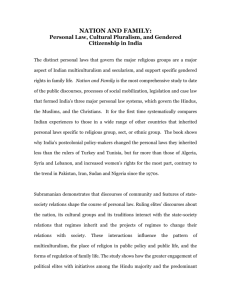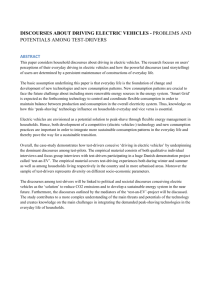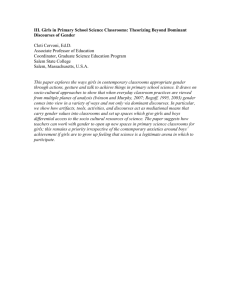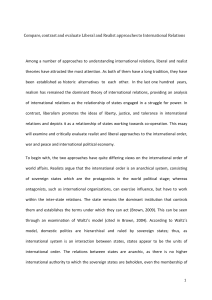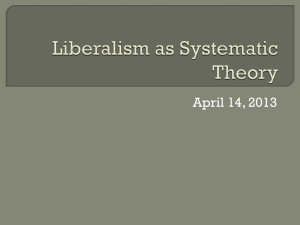Fullerton-Rangel-Rosa-Neg-tournament - openCaselist 2013-2014
advertisement
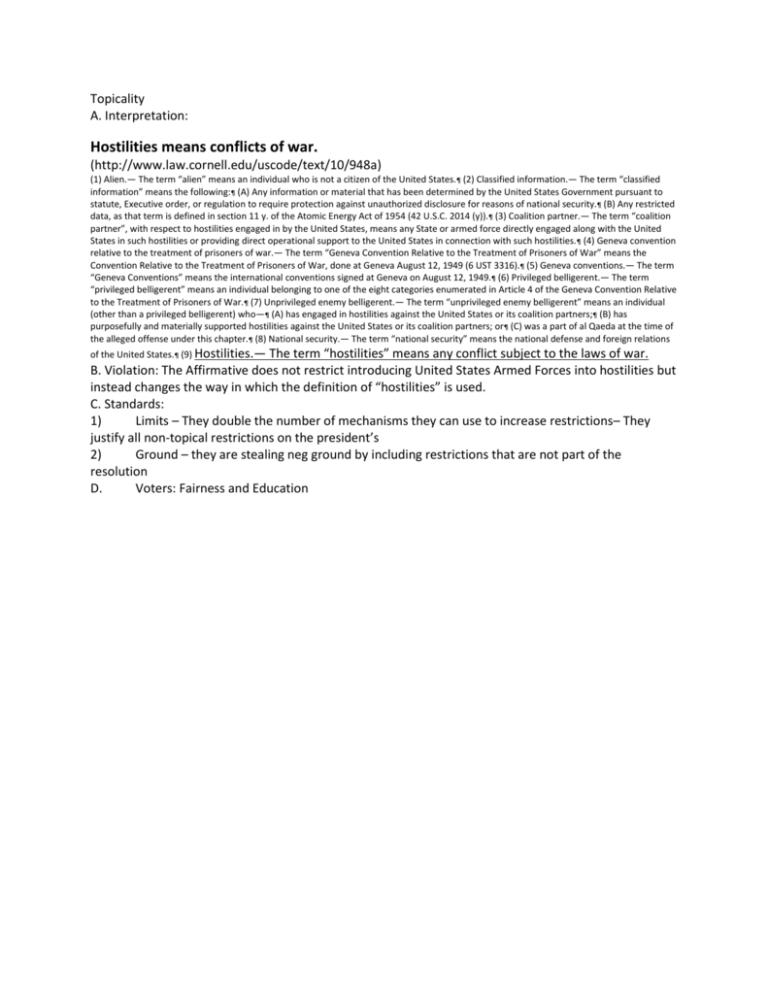
Topicality A. Interpretation: Hostilities means conflicts of war. (http://www.law.cornell.edu/uscode/text/10/948a) (1) Alien.— The term “alien” means an individual who is not a citizen of the United States.¶ (2) Classified information.— The term “classified information” means the following:¶ (A) Any information or material that has been determined by the United States Government pursuant to statute, Executive order, or regulation to require protection against unauthorized disclosure for reasons of national security.¶ (B) Any restricted data, as that term is defined in section 11 y. of the Atomic Energy Act of 1954 (42 U.S.C. 2014 (y)).¶ (3) Coalition partner.— The term “coalition partner”, with respect to hostilities engaged in by the United States, means any State or armed force directly engaged along with the United States in such hostilities or providing direct operational support to the United States in connection with such hostilities. ¶ (4) Geneva convention relative to the treatment of prisoners of war.— The term “Geneva Convention Relative to the Treatment of Prisoners of War” means the Convention Relative to the Treatment of Prisoners of War, done at Geneva August 12, 1949 (6 UST 3316).¶ (5) Geneva conventions.— The term “Geneva Conventions” means the international conventions signed at Geneva on August 12, 1949.¶ (6) Privileged belligerent.— The term “privileged belligerent” means an individual belonging to one of the eight categories enumerated in Article 4 of the Geneva Convention Relative to the Treatment of Prisoners of War.¶ (7) Unprivileged enemy belligerent.— The term “unprivileged enemy belligerent” means an individual (other than a privileged belligerent) who—¶ (A) has engaged in hostilities against the United States or its coalition partners;¶ (B) has purposefully and materially supported hostilities against the United States or its coalition partners; or ¶ (C) was a part of al Qaeda at the time of the alleged offense under this chapter.¶ (8) National security.— The term “national security” means the national defense and foreign relations of the United States.¶ (9) Hostilities.— The term “hostilities” means any conflict subject to the laws of war. B. Violation: The Affirmative does not restrict introducing United States Armed Forces into hostilities but instead changes the way in which the definition of “hostilities” is used. C. Standards: 1) Limits – They double the number of mechanisms they can use to increase restrictions– They justify all non-topical restrictions on the president’s 2) Ground – they are stealing neg ground by including restrictions that are not part of the resolution D. Voters: Fairness and Education Security K Shell Their impact claims of war and conflict are not objective – they are produced by the specific history of the observer and the drive for state security David Grondin 2004 (Masters in Political Science and Ph.D. Candidate – University of Ottawa, “(Re)Writing the ‘National Security State,’ Center for United States Studies, p. 12-17) Approaches that deconstruct theoretical practices in order to disclose what is hidden in the use of concepts such as “national security” have something valuable to say. Their more reflexive and criticallyinclined view illustrates how terms used in realist discourses, such as state, anarchy, world order, revolution in military affairs, and security dilemmas, are produced by a specific historical, geographical and socio-political context as well as historical forces and social relations of power (Klein, 1994: 22). Since realist analysts do not question their ontology and yet purport to provide a neutral and objective analysis of a given world order based on military power and interactions between the most important political units, namely states, realist discourses constitute a political act in defense of the state. Indeed, “[…] it is important to recognize that to employ a textualizing approach to social policy involving conflict and war is not to attempt to reduce social phenomena to various concrete manifestations of language. Rather, it is an attempt to analyze the interpretations governing policy thinking. And it is important to recognize that policy thinking is not unsituated” (Shapiro, 1989a: 71). Policy thinking is practical thinking since it imposes an analytic order on the “real world”, a world that only exists in the analysts’ own narratives. In this light, Barry Posen’s political role in legitimizing American hegemonic power and national security conduct seems obvious: U.S. command of the commons provides an impressive foundation for selective engagement. It is not adequate for a policy of primacy. […] Command of the commons gives the United States a tremendous capability to harm others. Marrying that capability to a conservative policy of selective engagement helps make U.S. military power appear less threatening and more tolerable. Command of the commons creates additional collective goods for U.S. allies. These collective goods help connect U.S. military power to seemingly prosaic welfare concerns. U.S. military power underwrites world trade, travel, global telecommunications, and commercial remote sensing, which all depend on peace and order in the commons” (Posen, 2003: 44 and 46). Adopting a more critical stance, David Campbell [d]anger is not an objective condition. It (sic) is not a thing which exists independently of those to whom it may become a threat. […] Nothing is a risk in itself; [...] it all depends on how one analyses the danger, considers the event” (Campbell, 1998: 1-2). In the same vein, national security discourse does not evaluate objective threats; rather, it is itself a product of historical processes and structures in the state and society that produces it. Whoever has the power to define security is then the one who has the authority to write legitimate security discourses and conduct the policies that legitimize them. The realist analysts and state leaders who invoke national security and act in its name are the same individuals who hold the power to securitize threats by inserting them in a discourse that frames national identity and freezes it.9 Like many concepts, realism is essentially contested. In a critical reinterpretation of realism, James Der Derian offers a genealogy of realism that deconstructs the uniform realism represented in IR: he reveals many other versions of realism that are never mentioned in International Relations texts (Der Derian, 1995: 367). I am aware that there are many realist discourses in International Relations, but they all share a set of assumptions, such as “the state is a rational unitary actor”, “the state is the main actor in international relations”, “states pursue power defined as a national interest”, and so on. I want to show that realism is one way of representing reality, not the reflection of reality. While my aim here is not to rehearse Der Derian’s genealogy of realism, I do want to spell out the problems with a positivist theory of realism and a correspondence philosophy of language. Such a philosophy accepts nominalism, wherein language as neutral description corresponds to reality. This is precisely the problem of epistemic realism and of the realism characteristic of American realist theoretical discourses. And since for poststructuralists language constitutes reality, a reinterpretation of realism as constructed in these discourses is called for.10 These scholars cannot refer points out that “ to the “essentially contested nature of realism” and then use “realism as the best language to reflect a self-same phenomenon” (Der Derian, 1995: 374). Let me be clear: I am not suggesting that the many neorealist and neoclassical realist discourses in International Relations are not useful. Rather, I want to argue that these technicist and scientist forms of realism serve political purposes, used as they are in many think tanks and foreign policy bureaucracies to inform American political leaders. This is the relevance of deconstructing the uniform realism (as used in International Relations): it brings to light its locatedness in a hermeneutic circle in which it is unwittingly trapped (Der Derian, 1995: 371). And as Friedrich Kratochwil argues, “[…] the rejection of a correspondence theory of truth does not condemn us, as it is often maintained, to mere ‘relativism’ and/or to endless “deconstruction” in which anything goes but it leaves us with criteria that allows us to distinguish and evaluate competing theoretical creations” (Kratochwil, 2000 : 52). Given that political language is not a neutral medium that gives expression to ideas formed independently of structures of signification that sustain political action and thought, American realist discourses belonging to the . We are trapped in the production of discourses in which national leaders and security speech acts emanating from realist discourses develop and reinforce a notion of national identity as synonymous with national security. U.S. national security conduct should thus be understood through the prism of the theoretical discourses of American political leaders and realist scholars that co-constitute it. Realist discourses depict American political leaders acting in defense of national security, and political leaders act in the name neorealist or neoclassical realist traditions cannot be taken as mere descriptions of reality of national security. In the end, what distinguishes realist discourses is that they depict the United States as having behaved like a national security state since World War II, while legitimating the idea that the United States should continue to do so. Political scientists and historians “are engaged in making (poesis), not merely recording or reporting” (Medhurst, 2000: 17). Precisely in this sense, rhetoric is not the description of national security conduct; it constitutes it. It is difficult to trace the exact origins of the concept of “national security”. It seems however that its currency in policymaking circles corresponds to the American experience of the Second World War and of the early years of what came to be known as the “Cold War”. In this light, it is fair to say that the meaning of the American national security state is bound up with the Cold War context. If one is engaged in deciphering the meaning of the Cold War prism for American leaders, what matters is not uncovering the “reality” of the Cold War as such, but how, it conferred meaning and led people to act upon it as “reality”. The Cold War can thus be seen as a rhetorical construction, in which its rhetorical dimensions gave meaning to its material manifestations, such as the national security state apparatus. This is not to say that the Cold War never existed per se, nor does it “make [it] any less real or less significant for being rhetorical” (Medhurst, 2000: 6). As Lynn Boyd Hinds and Theodore Otto Windt, Jr. stress, “political rhetoric creates political reality, structures belief systems, and provides the fundamental bases for decisions” (Hinds and Windt, cited in Medhurst, 2000: 6). In this sense, the Cold War ceases to be a historical period which meaning can be written permanently and becomes instead a struggle that is not context-specific and not geared towards one specific enemy. It is “an orientation towards difference in which those acting on behalf of an assumed but never fixed identity are tempted by the lure of otherness to interpret all dangers as fundamental threats which require the mobilization of a population” (Campbell, 2000: 227). Indeed, if the meaning of the Cold War is not context-specific, the concept of national security cannot be disconnected from what is known as the Cold War, since its very meaning(s) emerged within it (Rosenberg, 1993 : 277).11 If the American national security state is a given for realist analysts,12 it is important to ask whether we can conceive the United States during the Cold War as anything other than a national security state.13 To be clear, I am not suggesting that there is any such essentialized entity as a “national security state”.14 When I refer to the American national security state, I mean the representation of the American state in the early years of the Cold War, the spirit of which is embodied in the National Security Act of 1947 (Der Derian, 1992: 76). The term “national security state” designates both an institutionalization of a new governmental architecture designed to prepare the United States politically and militarily to face any foreign threat and the ideology – the discourse – that gave rise to as well as symbolized it. In other words, to understand the idea of a national security A national security state feeds on threats as it channels all its efforts into meeting current and future military or security threats. The creation of the CIA, the Department of Defense, the Joint Chiefs of Staff, and the National Security Council at the onset of the Cold War gave impetus to a state mentality geared to permanent preparedness for war. The construction of threats is thus essential to its well-being, making intelligence agencies privileged tools in accomplishing this task. As American historian of U.S. foreign relations Michael Hogan observes in his study on the rise of the national security state during the Truman administration, “the national security ideology framed the Cold War discourse in a system of symbolic representation that defined America’s national identity by reference to the un-American ‘other,’ usually the Soviet Union, Nazi Germany, or some other totalitarian power” (Hogan, 1998: 17). Such a binary system made it difficult for any domestic dissent from U.S. policy to emerge – it would have “amounted to an act of disloyalty” (Hogan, 1998: 18).15 While Hogan distinguishes advocates from critics of the American national security state, his view state, one needs to grasp the discursive power of national security in shaping the reality of the Cold War in both language and institutions (Rosenberg, 1993 : 281). takes for granted that there is a given and fixed American political culture that differs from the “new” national security ideology. It posits an “American way”, produced by its cultural, political, and historical experience. Although he stresses that differences between the two sides of the discourse are superficial, pertaining solely to the means, rather than the ends of the national security state, Hogan sees the national security state as a finished and legitimate state: an American state suited to the Cold War context of permanent war, while stopping short of a garrison state: Although government would grow larger, taxes would go up, and budget deficits would become a matter of routine, none of these and other transformations would add up to the crushing regime symbolized in the metaphor of the garrison state. The outcome instead would be an American national security state that was shaped as much by the country’s democratic I disagree with this essentialist view of the state identity of the United States. The United States does not need to be a national security state. If it was and is still political culture as it was by the perceived military imperatives of the Cold War (Hogan, 1998: 22). constructed as such by many realist discourses, it is because these discourses serve some political purpose. Moreover, in keeping with my poststructuralist inclinations, I maintain that identity need not be, and indeed never is, fixed. In a scheme in which “to say is to do”, that is, from a perspective that accepts the performativity of language, culture becomes a relational site where identity politics happens rather than being a substantive phenomenon. In this sense, culture is not simply a social context framing foreign policy decision-making. Culture is “a signifying part of the conditions of possibility for social being, […] the way in which culturalist arguments themselves secure the identity of subjects in whose name they speak” (Campbell, 1998: 221). The Cold War national security culture represented in realist discourses was constitutive of the American national security state. There was certainly a conflation of theory and policy in the Cold War military-intellectual complex, which “were observers of, and active participants in, defining the meaning of the Cold War. They contributed to portray the enemy that both reflected and fueled predominant ideological strains within the American body politic. As scholarly partners in the national security state, they were instrumental in defining and disseminating a Cold War culture” (Rubin, 2001: 15). This national security culture was “a complex space where various representations and representatives of the national security state compete to draw the boundaries and security culture has been maintained by political practice (on the part of realist analysts and political leaders) through realist discourses in the post-9/11 era and once again reproduces the idea of a national security state. This (implicit) state identification is neither accidental nor inconsequential. From a poststructuralist vantage point, the identification process of the state and the nation is always a negative process for it is achieved by exclusion, violence, and dominate the murkier margins of international relations” (Der Derian, 1992: 41). The same Cold War marginalization. Thus, a deconstruction of practices that constitute and consolidate state identity is necessary: the writing of the state must be revealed through the analysis of the discourses that constitute it. The state and the discourses that (re)constitute it thus frame its very identity and impose a fictitious “national unity” on society; it is from this fictive and arbitrary creation of the modernist dichotomous discourses of inside/outside that the discourses (re)constructing the state emerge. It is in the creation of a Self and an Other in which the state uses it monopolistic power of legitimate violence – a power socially constructed, following Max Weber’s work on the ethic of responsibility – to construct a threatening Other differentiated from the “unified” Self, the national society (the nation).16 It is through this very practice of normative statecraft,17 which produces threatening Others, that the international sphere comes into being. David Campbell adds that it is by constantly articulating danger through foreign policy that the state’s very conditions of existence are generated18. The process of security leads to unending violence and wars against populations of created threats Duschinski 2009 – Assistant Prof of Sociology and Anthropology, Ohio University (Haley, “Destiny Effects: Militarization, State Power, and Punitive Containment in Kashmir Valley.” Anthropological Quarterly, Volume 82, Number 3, Summer 2009, Project MUSE) Patterns of war emerging in particular local worlds are tied to larger transformations in political-military economies of violence operating on a global scale (Lutz and Nonini 2000:79). The expansion of neoliberal market capitalism since World War II has fed the growth of permanent war economies while also creating large surplus populations that are considered peripheral to the workings of capitalist economies. "State armies, multilateral armed forces (IFOR, the United Nations), private armies, militarized police, and parasitical militias have come to wage a systematic form of 'low intensity warfare,' often against stigmatized populations 'outside the grids' of global capitalist activity and superfluous to labor, [End Page 693] capital, and consumption markets" (Lutz and Nonini 2000:78). These interlinked processes of neoliberalism and privatization, ethnic and racial discrimination, and jingoism and militarism have led to the proliferation of infinite and indefinite wars that consolidate collectively imagined national communities at the same time that they violently exclude certain categories of people from participation in the life of the nation. As Victoria Sanford argues, national security states are based, not on the outwardly focused defense of national territory, but rather on a national security ideology that " is grounded in the recourse of coercion and has no room for the participation or consent of civil society" (2003:394-395). Through such ideological work, national security states erase the everyday realities of violence and power their shadow zones and sensitive peripheries in the name of national integrity and cohesion and in the interest of wartime profit.This state practice of carving out differential patterns of citizenship through the waging of perpetual warfare leads to a blurring of boundaries between "crimes of war" and "crimes of peace," producing a continuum of violence that scales from the routine violence of everyday social spaces, such as emergency rooms, court rooms, prisons, detention centers, and schools, to the spectacular violence of hot zones, such as border clashes, ethnic conflicts, and frontiers in the global war on terror (ScheperHughes 2002, 2008). These sites of exclusion and concentration provide for the encapsulation and confinement of those forms of political life that have been stripped of rights, cast into a "zone of social abandonment" (Biehl 2005), and subjected to the brutal violence of the state. Such conceptual tools enable us to move past distinctions between " the exception" and "the rule" and examine patterns of militarization that define forms of social suffering for communities living in various domains of threat and "legitimate" destruction: marginalized peasants cast as indigenous rebels in the Oaxaca and Chiapas regions of contemporary Mexico (Stephen 2000); Latino communities cast as drug runners and illegal immigrants along the US-Mexican border (Nagengast 2002); foreign nationals cast as enemy combatants in US military prisons in the War on Terror (Feldman 2005); Catholic nationalist women cast as paramilitary insurgents in the prisons of Belfast (Aretxaga 1997); Black youth cast as criminals in postApartheid South Africa (Comaroff and Comaroff 2006); and Puerto Rican men cast as gang members in the barrios of East Harlem (Bourgois 2002). Comparative ethnographies of the political and juridical [End Page 694] conditions that similarly delimit possibilities of life in these and other heavily militarized zones leads to a better understanding of "how dominant representations of the dangerous, the subversive, the worthless, the marginal, and the unimportant become linked to making particular groups of people susceptible to violence abuses that allow them to be treated with less than human respect and dignity" (Stephen 2000:823). Our alternative is to give back the gift of security. This reorients our conception of politics away from the realist state terrain that guarantees violence. Neocleous 08. ( Mark Neocleous is a Professor of the critique of Political Economy at Brunel University, UK and a member of the Editorial Collective of “Radical Philosophy”. Critique of Security. 186) Simon Dalby reports a personal communication with Michael Williams, co-editor of the important text Critical Security Studies, inwhich the latter asks: if you take away security, what do you put m the hole that's left behind? But I'm inclined to agree with Dalby: maybe there is no hole. The mistake has been to think that there is a hole and that this hole needs to be filled with a new vision or revision of security in which it is re-mapped or civilised or gendered or humanised or expanded or whatever. All of these ultimately remain within the statist political imaginary, and consequently end up reaffirming the state as the terrain of modern politics, the grounds of security. The real task is not to fill the supposed hole with yet another vision of security, but to fight for an alternative political language which takes us beyond the narrow horizon of bourgeois security and which therefore does not constantly throw us into the arms of the state. That's the point of critical politics: to develop a new political language more adequate to the kind of society we want. Thus while much of what I have said here has been of a negative order, part of the tradition of critical theory is that the negative may be as significant as the positive in setting thought on new paths. For if security really is the supreme concept of bourgeois society and the fundamental thematic of liberalism, then to keep harping on about insecurity and to keep demanding 'more security' (while meekly hoping that this increased security doesn't damage our liberty) is to blind ourselves to the possibility of building real alternatives to the authoritarian tendencies in contemporary politics. To situate ourselves against security politics would allow us to circumvent the debilitating effect achieved through the constant securitising of social and political issues, debilitating in the sense that 'security' helps consolidate the power of the existing forms of social domination and justifies the short-circuiting of even the most democratic forms. It would also allow us to forge another kind of politics centered on a different conception of the good. We need a new way of thinking and talking about social being and politics that moves us beyond security. This would perhaps be emancipatory in the true sense of the word. What this might mean, precisely, must be open to debate. But it certainly requires recognizing that security is an illusion that has forgotten it is an illusion requires recognising that security is not the same as solidarity. It requires accepting that insecurity is part of the human condition, and thus giving up the search for the certainty of security and instead learning to tolerate the uncertainties, ambiguities and ‘insecurities’ that come with being human; it requires accepting that ‘securitizing’ an issue does not mean dealing with it politically, but bracketing It out and handing it to the state; it requires us to be brave enough to return the gift . Politics 1NC Government shutdown not happening in the quo, but there is high risk if lack of focus ABC News, Sept. 26 ["Despite showdown, Boehner doesn't expect government shutdown" http://abcnews.go.com/blogs/politics/2013/09/despite-showdown-boehner-doesnt-expectgovernment-shutdown/ Given the political risks that come with a prolonged political ping pong match, Boehner was questioned whether he concedes that the government is headed for a shutdown next week. “No, I do not,” he insisted. “No, I do not expect that to happen.” Asked whether he is prepared to accept a clean continuing resolution from the Senate in order to avoid a government shutdown, Boehner hinted that more changes are coming from the House. “I made it clear now for months and months and months, we have no interest in seeing a government shutdown, but we’ve got to address the spending problem that we have in this town,” Boehner said. “There will be options available to us. There are not going to be any speculation about what we’re going to do or not do until the Senate passes their bill.” The plan would trade off with Congress’s ability to avert the shutdown - GOP has momentum and will, but they need literally every hour to get it done Frank James, 9-13-2013, “Congress Searches For A Shutdown-Free Future,” NPR, http://www.npr.org/blogs/itsallpolitics/2013/09/13/221809062/congress-searches-for-a-shutdownfree-future The only thing found Thursday seemed to be more time for negotiations and vote-wrangling. Republican leaders recall how their party was blamed for the shutdowns of the mid-1990s and earnestly want to avoid a repeat, especially heading into a midterm election year. Cantor alerted members Thursday that during the last week of September, when they are supposed to be on recess, they will now most likely find themselves in Washington voting on a continuing resolution to fund the government into October. It looks like lawmakers will need every hour of that additional time. While talking to reporters Thursday, Boehner strongly suggested that House Republicans weren't exactly coalescing around any one legislative strategy. "There are a lot of discussions going on about how — about how to deal with the [continuing resolution] and the issue of 'Obamacare,' and so we're continuing to work with our members," Boehner said. "There are a million options that are being discussed by a lot of people. When we have something to report, we'll let you know." Government shutdown would totally wreck oil rig safety – no inspection personnel Edward J. Markey 13, Ranking Member, Natural Resources Committee, 2013, “Republican Sequester or Shutdown Would Threaten Energy Development, Safety and the Environment,” http://democrats.naturalresources.house.gov/sites/democrats.naturalresources.house.gov/files/docum ents/2013-02-15_Sequester_Cuts.pdf Just after the sequestration deadline, Congress must pass by March 27 a so-called Continuing ¶ Resolution or omnibus appropriations bill to keep the government operating. House Republicans, however, have threatened this deadline by threatening the country with another crisis around to block funding and shut down the government. Rep. Aaron Shock (R-IL) said in late January, “I wouldn’t be surprised if a majority of the Republicans decide that the [right] battle to fight the president on is perhaps the government being shut down.”8 If this threat becomes a reality, it would undermine oil rig worker safety and environmental protections for drilling on public lands enforced by the Interior Department. The last time Republicans forced a government shutdown, in 1995, the former Minerals Management Service (MMS), the agency responsible for overseeing offshore oil and gas drilling at the time, was left with 12 emergency personnel, with only six employees dedicated to offshore safety and environmental protection. Currently, 409 people at BSEE perform these jobs. According to DOI, if the shutdown goes into effect, onshore oil and gas leasing activities would be entirely closed, as well as most permitting, inspection, and enforcement work. Unchecked oil spills crush marine oxygen Paul Stephen Dempsey, Law Prof @ Denver, Summer 1984, “Oil Pollution of the Marine Environment by Ocean Vessels,” 6 NW. J. INT'L L. & BUS. 459, ln Although large amounts of oil remain on the surface, much of it is mixed into the water column, either through wave action or the use of dispersants applied to oil slicks. Unfortunately, as the spill breaks up, the environmental hazard does not disappear; it increases. Dissolved oil and oil globules fall through the water column, growing more toxic as they approach bottom. Concentrations of dissolved oil from 0.2 to 1 part per billion, a harmful level already found in coastal waters near many cities, can skyrocket to as high as 250 parts per billion. n26 [*467] High levels of dissolved oil increase the concentration of toxic chemicals in commercial fish and severely disrupt the marine food chain. Oil pollution reduces the ocean's phytoplankton in coastal areas, where most of the world's commercial fish and oxygen are produced. Sea beds, an essential source of food for bottom dwelling commercial fish, become contaminated and sterile. The ramifications of introducing such high concentrations of petroleum pollution into the oceans are severe. Oil pollution disrupts phytoplankton, the microscopic plant life in the ocean that forms algae and serves an important function in the ecosystem. First, oil interferes with phytoplankton photosynthesis. Such interference may eventually reduce the oxygen output and the carbon dioxide uptake of ocean. Moreover, increased carbon dioxide in the atmosphere may cause a "greenhouse effect," such that heat will not be allowed to radiate into space, causing an increase in global temperatures. As a long term effect, the ice caps could eventually melt, causing the sea level to increase up to 200 feet, submerging most coastal cities. n27 This results in Extinction Donald A. Bryant, Dep. Biochem @ Penn. State, 2003, “The Beauty in small things revealed,” Proceedings of the National Academy of Sciences, http://www.pnas.org/content/100/17/9647.full Oxygenic photosynthesis accounts for nearly all the primary biochemical production of organic matter on Earth. The byproduct of this process, oxygen, facilitated the evolution of complex eukaryotes and supports their/our continuing existence. Because macroscopic plants are responsible for most terrestrial photosynthesis, it is relatively easy to appreciate the importance of photosynthesis on land when one views the lush green diversity of grasslands or forests. However, Earth is the “blue planet,” and oceans cover nearly 75% of its surface. All life on Earth equally depends on the photosynthesis that occurs in Earth's oceans. A rich diversity of marine phytoplankton, found in the upper 100 m of oceans, accounts only for ≈1% of the total photosynthetic biomass, but this virtually invisible forest accounts for nearly 50% of the net primary productivity of the biosphere (1). Moreover, the importance of these organisms in the biological pump, which traps CO2 from the atmosphere and stores it in the deep sea, is increasingly recognized as a major component of the global geochemical carbon cycle (2). It seems obvious that it is as important to understand marine photosynthesis as terrestrial photosynthesis, but the contribution of marine photosynthesis to the global carbon cycle was grossly underestimated until recently. Satellite-based remote sensing (e.g., NASA sea-wide field sensor) has allowed more reliable determinations of oceanic photosynthetic productivity to be made (refs. 1 and 2; see Fig. 1).
